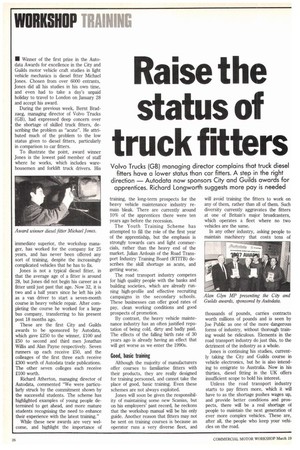Raise the status of truck fitters
Page 118

If you've noticed an error in this article please click here to report it so we can fix it.
Volvo Trucks (GB) managing director complains that truck diesel fitters have a lower status than car fitters. A step in the right direction — Autodata now sponsors City and Guilds awards for apprentices. Richard Longworth suggests more pay is needed
• Winner of the first prize in the Autodata Awards for excellence in the City and Guilds motor vehicle craft studies in light vehicle mechanics is diesel fitter Michael Jones. Chosen from over 6000 entrants, Jones did all his studies in his own time, and even had to take a day's unpaid holiday to travel to London on January 28 and accept his award.
During the previous week, Bernt Bradzaeg, managing director of Volvo Trucks (GB), had expressed deep concern over the shortage of skilled truck fitters, describing the problem as "acute". He attributed much of the problem to the low status given to diesel fitters, particularly in comparison to car fitters.
To illustrate the point, award winner Jones is the lowest paid member of staff where he works, which includes warehousemen and forklift truck drivers. His immediate superior, the workshop manager, has worked for the company for 25 years, and has never been offered any sort of training, despite the increasingly complicated vehicles that he has to fix.
Jones is not a typical diesel fitter, in that the average age of a fitter is around 28, but Jones did not begin his career as a fitter until just past that age. Now 32, it is two and a half years since he left his job as a van driver to start a seven-month course in heavy vehicle repair. After completing the course he worked for a large bus company, transferring to his present post 18 months ago.
These are the first City and Guilds awards to be sponsored by Autodata, which gave £250 to the winner, £100 and £50 to second and third men Jonathan Willis and Alan Payne respectively. Seven runners up each receive .250, and the colleages of the first three each receive £300 worth of Autodata trade publications. The other seven colleges each receive £100 worth.
Richard Atherton, managing director of Autodata, commented "We were particularly struck by the commitment shown by the successful students. The scheme has highlighted examples of young people determined to get ahead, and more mature students recognising the need to enhance their experience with the latest training."
While these new awards are very welcome, and highlight the importance of training, the long-term prospects for the heavy vehicle maintenance industry remain bleak. There are currently around 10% of the apprentices there were ten years ago before the recession.
The Youth Training Scheme has attempted to fill the role of the first year of the apprentiship, but the emphasis is strongly towards cars and light commercials, rather than the heavy end of the market Julian Ardouin of the Road Transport Industry Training Board (RTITB) describes the skill shortage as acute, and getting worse.
The road transport industry competes for high quality people with the banks and building societies, which are already running high-profile and effective recruiting campaigns in the secondary schools. These businesses can offer good rates of pay, clean working conditions and good prospects of promotion.
By contrast, the heavy vehicle maintenance industry has an often justified reputation of being cold, dirty and badly paid. The effects of the falling birth rate of 30 years ago is already having an effect that will get worse as we enter the 1990s.
Good, basic trailing
Although the majority of manufacturers offer courses to familiarise fitters with their products, they are really designed for training personnel, and cannot take the place of good, basic training. Even these schemes are not always exploited.
Jones will soon be given the responsibility of maintaining some new Scanias, but on his employers' past record, he reckons that the workshop manual will be his only guide. Another reason that fitters may not be sent on training courses is because an operator runs a very diverse fleet, and will avoid training the fitters to work on any of them, rather than all of them. Such diversity currently aggravates the fitters at one of Britain's major broadcasters, which operates a fleet where no two vehicles are the same.
In any other industry, asking people to maintain machinery that costs tens of thousands of pounds, carries contracts worth millions of pounds and is seen by Joe Public as one of the more dangerous forms of industry, without thorough training would be ridiculous. Elements in the road transport industry do just this, to the detriment of the industry as a whole.
Jones is continuing his studies, currently taking the City and Guilds course in vehicle electronics, but he is also intending to emigrate to Australia. Now in his thirties, diesel fitting in the UK offers insufficient scope to hold his interest.
Unless the road transport industry starts to pay fitters more, which it will have to as the shortage pushes wages up, and provide better conditions and prospects, there will be a real shortage of people to maintain the next generation of ever more complex vehicles. These are, after all, the people who keep your vehicles on the road.
































































































































